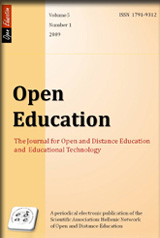Constructivist design and evaluation of interactive educational software: a research-based approach and examples
Résumé
The paper introduces constructivist views of learning as a theoretical background to inform the design, implementation and evaluation of quality interactive multimedia educational software. It reviews various constructivist views of learning and also constructivist technology-mediated learning. It proposes an approach to design and evaluation of constructivist educational software, which is based on research in students’ ideas, and comprises three stages: a) initial research into students’ existing ideas, conceptions, conceptual difficulties and needs, b) design of the software based on students’ conceptions and conceptual needs, and formative evaluation of it, and c) software implementation and evaluation within a constructivist learning environment, based on students’ conceptual change and construction of appropriate knowledge by them. This research-based approach is compared to other existing models of design educational software environments. In order to illustrate this approach, two examples of Greek constructivist educational software with science content are briefly presented: “Interaction between Objects”, which aims at promoting knowledge construction about mechanical interaction and Newton’s laws through interactive simulations of real-life situations and cognitive conflict processes, and “M.A.TH.I.M.A.”, aiming at promoting construction of multiple, linked appropriate representations about several science topics (free-fall phenomenon, geometrical optics, heat and temperature, electric circuits, molecules and atoms). The proposed approach intends to enhance collaboration between software designers, content education research specialists, teachers and learners, in order to improve the quality of educational software to better respond to students’ learning with understanding.
Article Details
- Comment citer
-
- Numéro
- Vol. 5 No 1 (2009)
- Rubrique
- Μέρος πρώτο / Section 1
Οι συγγραφείς των άρθρων που δημοσιεύονται στο περιοδικό διατηρούν τα δικαιώματα πνευματικής ιδιοκτησίας επί των άρθρων τους, δίνοντας στο περιοδικό το δικαίωμα της πρώτης δημοσίευσης. Άρθρα που δημοσιεύονται στο περιοδικό διατίθενται με άδεια Creative Commons 4.0 και σύμφωνα με την άδεια μπορούν να χρησιμοποιούνται ελεύθερα, με αναφορά στο/στη συγγραφέα και στην πρώτη δημοσίευση για μη κερδοσκοπικούς σκοπούς και με δικαίωμα τροποποίησης μόνον με παρόμοια διανομή (αν αναμείξετε, τροποποιήσετε, ή δημιουργήσετε πάνω στο υλικό, πρέπει να διανείμετε τις δικές σας συνεισφορές υπό την ίδια άδεια όπως και το πρωτότυπο).
Téléchargements
Les données relatives au téléchargement ne sont pas encore disponibles.



